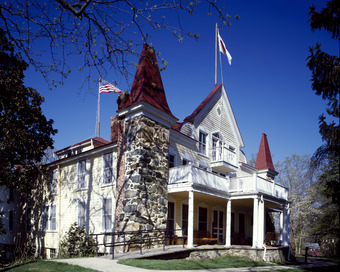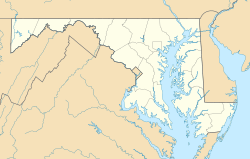Clara Barton National Historic Site facts for kids
|
Clara Barton National Historic Site
|
|

The Clara Barton House
|
|
| Location | 5801 Oxford Rd., Glen Echo, Maryland |
|---|---|
| Area | 9 acres (3.6 ha) |
| Built | 1891 |
| Architect | Julian B. Hubbell |
| Website | Clara Barton National Historic Site. |
| NRHP reference No. | 66000037 |
Quick facts for kids Significant dates |
|
| Added to NRHP | October 15, 1966 |
| Designated NHL | January 12, 1965 |
| Designated NHS | 1974 |
The Clara Barton National Historic Site is a special place where you can learn about the amazing life of Clara Barton. She was a pioneer teacher, nurse, and humanitarian who started the American Red Cross. This site, which includes her old home, was created in 1974.
It's located about 2 miles (3.2 km) northwest of Washington D.C. in Glen Echo, Maryland. This United States National Historic Site protects 9 acres (0.04 km2) of land. It includes Barton's 38-room former home. The National Park Service cares for the site. It was the first national historic site dedicated to the achievements of a woman. It helps us remember the early days of the American Red Cross and where its founder lived her last years. Clara Barton lived in this Glen Echo home from 1897 to 1912. It also served as an early office for the American Red Cross.
Contents
About Clara Barton's Home
Clara Barton's house is a large, unique building with a fascinating history. It was built in 1891 and became a very important place for her work.
A Special House with a History
The house was partly built using wood saved from emergency buildings. These buildings were put up by the Red Cross after the terrible Johnstown Flood of 1889 in Johnstown, Pennsylvania. The wood was brought to Washington D.C. by the Chesapeake and Ohio Canal. It was stored until 1891 when construction began. The land for the house was given by Edwin and Edward Baltzley. They were creating a special learning community in Glen Echo.
Dr. Julian B. Hubbell, the first field agent for the American Red Cross, designed the house. He also watched over the building work. The original house had a big stone front, matching other buildings in the area. In 1897, when Barton moved in for good, the middle part of the stone front was removed. This created two stone towers on the sides. Pointed roofs were added, making the deep, narrow house look even more striking.
Even though it's a huge house, it's quite simple inside and designed to be useful. The interior looks like a Mississippi River steamboat. It has 36 rooms and 38 closets! There are three levels of rooms around a central hallway. Colorful windows high up let in light. After Clara Barton passed away, the inside was changed into eight apartments. The Friends of Clara Barton group bought the house in 1963.
In 1965, the United States Congress named the Clara Barton House a National Historic Landmark. It was then added to the National Register of Historic Places in 1966. The property officially became a National Historic Site in 1974.
Preserving History: Restoration Efforts
The National Park Service (NPS) bought the house from the Friends of Clara Barton in 1975. The Friends group had already made some repairs. However, the NPS decided that more work was needed to make the house strong and safe. The NPS restored 11 rooms, including the Red Cross offices, living rooms, and Clara Barton's bedroom. In 1981, a special event was held to celebrate the site's reopening.
Visitors could take guided tours through the three levels of the house. These tours helped people understand how Barton lived and worked in her unique home. It showed them all the things that were part of her life's important work. In 2005, over 12,500 people visited the site.
In October 2015, the site closed for more repairs. It stayed closed for a while, reopening to the public in 2022. The NPS has found more structural issues, so the second and third floors of the house are currently closed.
See also
 | Claudette Colvin |
 | Myrlie Evers-Williams |
 | Alberta Odell Jones |



